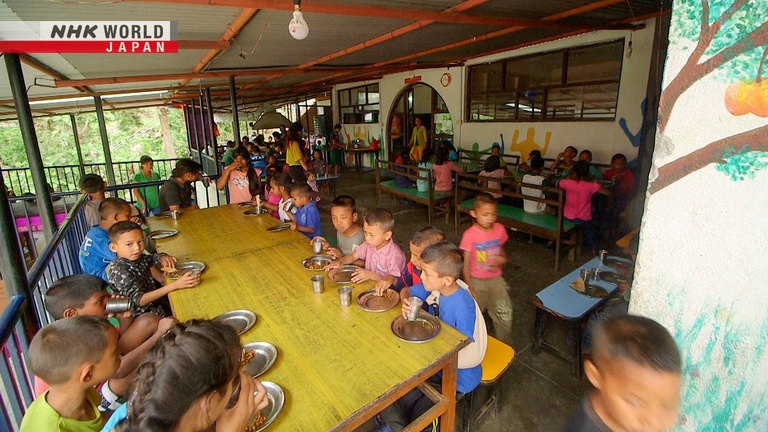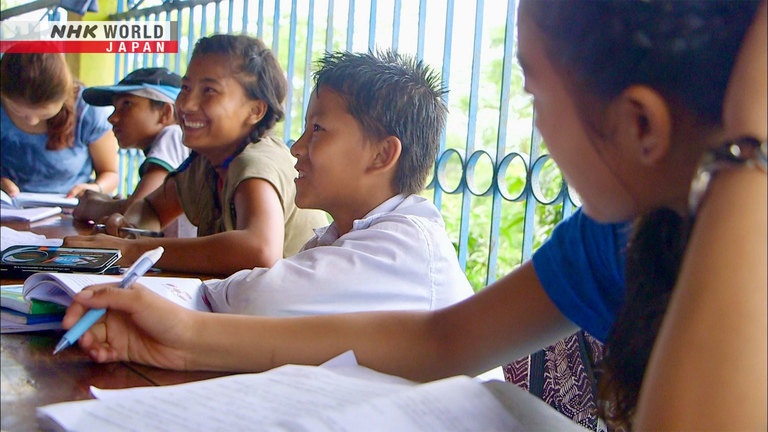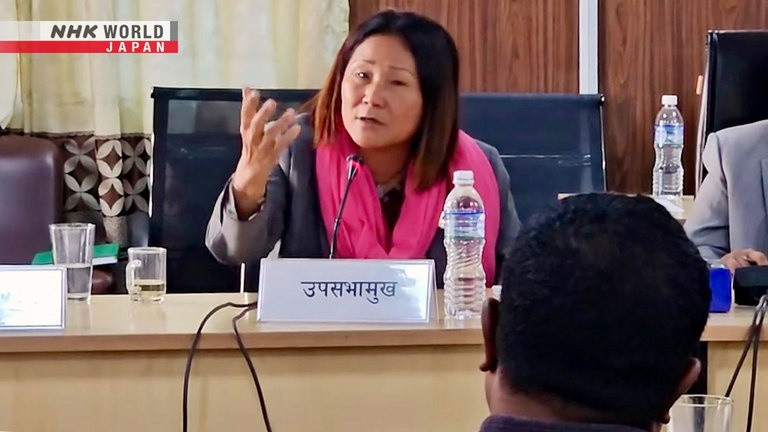A Brighter Future for Prisoners' Children: Indira Ranamagar / Founder of Prisoner's Assistance Nepal
In Nepal, prisoners' children often end up on the streets. Indira Ranamagar founded an NGO that cares for such children. In 2022 she was elected to parliament, where she works to improve their rights.




Transcript
Direct Talk
Nestled in the Himalayas,
Nepal is undergoing rapid modernization.
At the same time, crime is also on the rise.
One major issue is
the children of those convicted.
With nobody willing to take them in,
many end up on the streets.
One woman has spent 30 years
on a grassroots campaign
to foster and care for these children.
Indira Ranamagar.
Indira Ranamagar
Founder, Prisoner's Assistance Nepal
She has built homes across Nepal
for children of prisoners,
providing food, clothes,
and housing for free,
and even sending them to school.
In 2022, she was elected to
Nepal's House of Representatives,
where she advocates for improving
the rights of prisoners' children.
You're treating these kids
as if they're terrorists.
Who put them in that situation?
Was it not our very own society?
What happens to Nepal's future
if we don't invest in our children?
They are the ones who will build
our society 100 years from now.
For Indira, rescuing children shunned
by society is a way to help Nepal grow.
What challenges does she face
in bringing her plan to fruition?
Kathmandu, Nepal's capital.
This is the home of
Prisoner's Assistance Nepal,
an NGO established by Indira Ranamagar.
The goal of this NGO is to protect and provide
education to the children of prisoners.
Additionally, I rescued four children,
which is father killed a mother.
And these children, you know,
when parents go to the prison, it is not like
rich people they go to the prison,
mostly very poor.
And these children really,
one is social stigma
and one is they know they don't have
a proper guardian, you know.
These issues are neglected
by society and government
and even their own family.
Never they take care of them.
Nepal has no laws about
the custody of children with no family.
Some children have no choice but
to live with their parents in prison.
In the prison, even the prison, still they
don't get enough basic needs, basic food.
So being this innocent,
you know, little children,
they need a good, proper food.
And same time, they need a good environment.
That's why I created PA Nepal.
Between her work as a politician,
Indira still volunteers her time to serve as
mother to children with parents in prison.
Did you speak English to the teacher?
Yes.
I said "My mother is so busy."
"My mother is so busy."
You said that?
Ha ha ha. My mother is so busy.
Indira has built ten facilities
for prisoners' children across Nepal,
housing around 200 kids,
from infants to college students.
The charity's annual budget
for the facilities and other activities
is around 300,000 US dollars.
Most comes from donations from foreign
countries like Spain and the Netherlands.
Hi, Mom!
Once a month, Indira visits the facilities
to check on each child's health
and make sure they're not
having any problems.
In addition to caring for the children,
she also supports their parents.
Indira points out that many of
the convicted Nepalese women
were arrested for introducing friends
to human trafficking brokers.
And trafficking, you know,
mostly like a real actor, real criminal,
they use them to
cross the border, India border.
So that's why they go in prison.
Around 20% of Nepal's population
works outside of the country,
and there are continuing
cases of trafficking,
in which young women are
forced into prostitution abroad.
Brokers often use local women to convince
young women to let down their guard.
The brokers tell them that
they have an opening for a good job.
When the women introduce
their friends, many are arrested.
I think it's poverty also, I tell you,
poverty, lack of education is still.
And mostly these people are
most vulnerable, you know.
Mostly these people are more chances
to abuse and traffic by the criminal again.
To encourage parents
to rejoin society after release,
Indira regularly takes
their children to visit.
And the main thing is to
try to bring their children together.
When they see their children
getting education,
being well and they have
a hope to come out.
And we try to have them to reform,
you know, inside emotionally.
So this is what we try to do.
Some of the prisoners
have never attended school.
Indira sends teachers
to the prison in Kathmandu
to help educate those who want to
find good jobs to support their children.
Indira's desire to help those who have fallen
on hard times comes from her own background.
She was born in a farming village
in eastern Nepal in 1970.
Actually, I grew up in the community,
you know, in very small village.
My brother used to go to school
and I can't go because I'm a girl.
I felt really sad, you know.
She begged her older brother
to teach her to read and write
and was finally permitted
to attend school at age 11.
Indira dedicated herself to her studies,
saving money to attend
university in Kathmandu.
At age 19, she visited
a prison as a volunteer.
Seeing children living behind bars
sparked the journey she continues today.
So I felt that
I thought I am disadvantaged child.
But I felt these children are
more vulnerable and disadvantaged.
That is my turning point of life.
At the beginning,
I used to go to inside the prison.
I saw, I tell the jailer
"I'd like to teach them, you know,
these children are, they are not studying,
nothing there inside."
So I went there to teach these children.
And
this way I influence the people,
you know, police and jailer.
And they said that
she's a real social worker.
And they gave me access to go inside.
Through regular prison visits,
she won the trust of parents.
Eventually she was permitted
to take the children out
and let them stay at her home.
She established PA Nepal in 2000.
Indira.
In 2014, she was granted an award for her
contributions to improving children's rights,
by the World's Children's Prize Foundation,
an international group based in Sweden.
So I try to open
all my children's opportunity.
Because having education is
not enough here, you know.
To give them opportunities is the
biggest challenge here, biggest task.
And these children, if they go wrong way
and if they do crime, you know.
See, this continue, you know, a cycle come.
You know, I try to break this cycle
to give them opportunity,
give them love and care.
So that's I try to do that in my whole life.
Indira sees that all of the children
under her care graduate high school,
and even arranges free higher education and
professional training for those who want it.
It's a life-changing opportunity
for Nepalese children,
only 30% of whom graduate high school.
Indira's efforts gave 22-year-old Rojina
the chance to pursue further education.
Job training sparked an interest
in computer work,
and she's now studying
cybersecurity at college.
Rojina was raised by a single father who was
arrested for drug use when she was five.
Indira took her in.
If Indira hadn't taken me in,
I wouldn't be here studying.
I'd have gone missing or turned
to crime, done something bad.
Just thinking about it scares me.
With graduation around the corner,
she's begun working in PA Nepal's IT office.
Indira is my role model.
She's why I want to work here.
She said this is a home
for all of us.
She encouraged me to be positive
and think about the future.
Many people are cold to others
but Mom always offers to help
That's the kind of person
I want to be.
I want to give back to PA Nepal.
Help Mom however I can.
Indira has helped raise over
two thousand children so far.
Many have built lives for themselves,
pursuing careers as
police officers, or nurses.
Over 30 years of hard work has changed
futures for the children of Nepal's prisoners.
In 2022, Indira made the decision
to stand for national election.
I decided to come to politics, you know.
I worked 34 years,
but nothing I can change it.
You know, still there is
a lot of law is pending.
There is no, we don't have
a proper child protection law.
If I die, if this children doesn't have
a child protection bill, proper bill.
So again, these children end up in the street
and there is a high risk for the trafficking,
high risk for the abuse and high risk
for the child labor and everything, you know.
That's why also I joined politics
to bring the good law.
She was elected as a member
of an opposition party
that stands for food aid to the poor,
and broader social support.
In October 2023, she appeared before
the government's human rights commission.
She spoke to members
of parliament and officials
about the plight of prisoners' children.
I've seen children screaming
as their parents are arrested.
Local police call me in
the middle of the night.
"We're arresting a mother. Please take
her kids. They've nowhere to go."
Children are torn from their
mother's arms and I take them in.
I see none of you know of this.
Children must be raised with
healthy bodies and minds.
They need mental health services.
How many requests have you heard?
The government must provide this.
Her proposal has not yet led to action.
But she will persist until the rights
of prisoners' children improve.
Do you have any words to live by?
Every person should have a right to live
with the dignity, treated as a human being.
Even like not only talking about
the prison, you know,
many communities, you know,
who are deprived communities,
they don't feel the right.
You know, we live in a small world,
you know, just one world.
But you see the unbalance of the people.
And these children, you know,
and now, little children,
they should go to the school.
They should have all the facility
what the children can get it.
And then these children, the future
of this country and this society.
And so if we invest
these children and people,
and then we can bring the good citizen.
And then we can make a
stable society and better society.